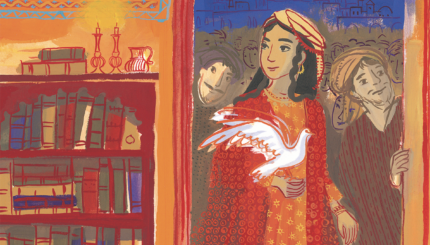I grew up 100 percent Camp Ramah and United Synagogue Youth (both Conservative movement institutions), but after marrying a Modern Orthodox man, my husband and I decided to raise our family Camp Stone, Bnei Akiva and NCSY (all Orthodox). We belong to a Modern Orthodox synagogue, and my kids went to a Modern Orthodox day school.
I have loved raising my family within this community. Carpools. Camp. meals. Cookouts. Parks. Travel. Friends who would watch my kids if I was in a bind or just needed a break. I had my village.
While some of the rigidity that comes along with community goes against my personal beliefs, I decided to simply set that aside in favor of all the beauty in Orthodox Judaism. I am constantly grateful for the halakhic boundaries that have made parenting easier. When my kids were little, they would throw a tantrum at the grocery store over a “must-have.” But if it wasn’t kosher, there was no tantrum. We would fight over too much TV, but for twenty-five hours every Shabbat there was no TV. Family dinners during the week were aspirational, but every Shabbat we ate together.
In my mind, the beauty exceeded the feminist issues that stumped me. Kol Isha, the prohibition on men hearing women sing. Mechitza, the barrier separating men and women during worship services. The marriage ceremony. And so on.
Until my son told us that he was gay.
My husband and I never wavered — not for one second — in our love and support of our son. But those first few weeks were very hard for me. I cried, a lot. I was surprised by my reaction. My head and my heart were not in sync. I did not care about people’s sexual orientation, but I hadn’t envisioned what that would look like in my own family. The family photo would look different.
In those first few weeks, I worried about my son’s friendships. I worried about his safety. I worried about his future. I worried about being a good mom. And I worried about my family’s place in our community.
Twenty-two years of making decisions based on community norms, and suddenly we were on the periphery. On the surface, no one treated us any differently. Friends and family were wonderful. But there were murmurings in the community. I heard that the school administration spoke with the faculty, asking them to keep an eye on our younger kids to make sure they were okay. Nice, yes. Naïve, totally. But no one reached out to us, the parents. Silence.
I wanted to wear my new status proudly. I wanted everyone to know that my son’s sexual orientation made no difference. But it was like learning a new language. Do you tell everyone you see? Do you casually bring the conversation around? I did not want a silence that could be misconstrued for discomfort. I had my first opportunity to test my new vocabulary at a Jewish Federation meeting at my house. My daughter sent me a picture of her new piercing (nose stud). Someone sitting next to me said, “Are you okay with that?” I responded, “Oh, that is totally no big deal. My son just told us he is gay.” Well, that news blast made everyone a little uncomfortable. So the script needed to be changed. I kept working at balancing my goals of announcing the news with avoiding making other people feel uncomfortable. Over time, however, my need to fill the silence has diminished.
And as I grew more comfortable with the news of my son’s sexual orientation, my relationship with the Jewish community grew more comfortable as well. As it turns out, being on the periphery isn’t all bad; actually it’s liberating. Once my son was “out,” I felt out too. All of a sudden, I felt a little less bound by what everyone else was doing and free to make my own decisions. And I felt way more compassion for other families who seemed to be on the periphery. Families whose kids’ needs couldn’t be met by the day school. The mother dealing with whispers of, “How could that mother let that girl leave the house looking like that?” I felt more empathic now that we had joined “other.”
So how do I reconcile the religious community’s discomfort with my son’s sexual orientation? I don’t. And I am not worried. I am optimistic and hopeful that my son, his siblings, and friends are finding their own way.
My prayer for my children, and everyone’s children, is that they find a meaningful and accepting religious home for themselves. And if one doesn’t exist, that they have the courage to build it.
Susan Borison is the mother of five and the editor of Your Teen Magazine, a magazine for parents of teenagers.



